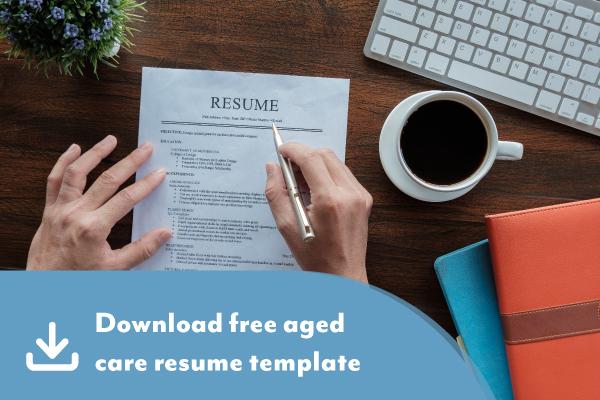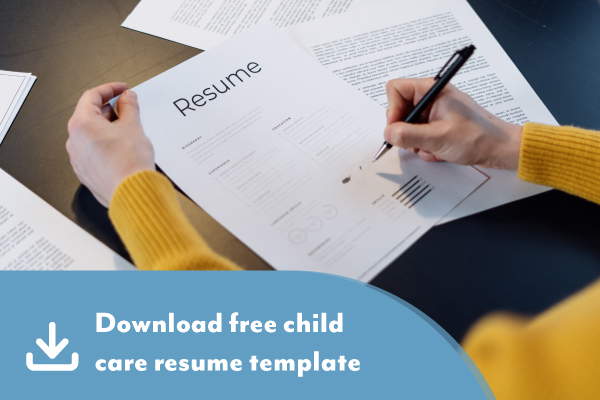The job application process is an exciting part of the journey to achieve your career goals. Now is the time to showcase what you have learnt through your training, explore job options and meet with a prospective employer in an aged care job interview.
To set yourself up to shine during the aged care job interview process, it is really helpful to be prepared for the experience.
Knowing what to expect and feeling like you’re equipped can go a long way toward making your feel confident and comfortable throughout the interview process. Plus, you will have a better chance of making an excellent first impression and securing the job you really want.
You’ve got that aged care qualification you’ve been working towards and now it’s time to put your newfound knowledge and skills into practice.

First things first: how to secure an interview
Before you begin worrying about how you will handle yourself in an aged care job interview, first you need to make sure you have done everything you can to position yourself to be invited for an interview. Along with getting the right qualifications for the right role, you need to polish a clear, professional resume.
Writing a resume that gets results isn’t as hard as you may think. With a few solid resume-writing tips, you can have a sparkling resume that will help you on your way to your dream aged care job. Some top tips include:
Keep it professional
Use your resume to demonstrate your professionalism and attention to detail. For example, while your email lukiepookie@gmail.com is fine for your personal life, luke_adams@gmail.com is more appropriate or work-related communications. It’s also important in this day and age that you set your socials to private or remove any unprofessional material as employers often screen applications via social media.
Customise your resume
Resumes and job applications aren’t one size fits all. Customise your resume to highlight your suitability, be specific. It can be tempting to include your entire employment history, but most employers will only want to know about the experience that’s relevant to the job you’re applying for. This can include voluntary work too. Add keywords from the job description in case the company is using a digital database to sift through the high amounts of resume they receive.
Highlight how great you are
Does your resume highlight everything you have to offer this employer? Make sure your resume shows why you’re so perfect for the job and makes you stand out from the rest. This often means tweaking your resume for each separate job you apply for to specifically highlight how you meet their criteria.
References
Your interviewer will likely want to contact former employers or trainers who can tell them a bit more about you. You can either include names and numbers of your references on your resume (make sure they’re up to date!) or include a note that references will be made available on request.
Don’t forget to fulfil all requests as per your chosen job advertisement. This could include a cover letter, references or a copy of your qualifications. If you’re unsure in the application process, calling the organisation to check on a few things can only be a good thing! Hopefully you’ll be receiving the call for an interview in no time.
Key factors to be prepared for an aged care job interview
You know that being prepared is essential for job interview success, but what does that really mean? Preparation is a bunch of different things that will help to put you at ease in the lead up, at the interview and hopefully ensure you feel confident about its outcome.
The key areas you need to consider to be prepared for your aged care job interview are:
Know exactly what you’re applying for
Read the position description, then read it again. The interviewer will likely structure the interview around the role you are applying for, so it’s important that you know how you fit the position description so you can clearly communicate your value in the interview.
Understand your prospective employer
Knowing a bit about an organisation’s role, services, values and approaches can help you better position yourself as the right candidate for them.
Plan the day
Where are you going, how are you getting there, what time do you need to leave, where will you park your car? There’s nothing worse than getting lost on the way, feeling frantic and arriving late to your job interview. Plan it out beforehand to minimise any challenges.
Look the part
Presenting yourself well is essential in any job interview. This means being dressed neatly and appropriately and focusing on your personal hygiene, as well as smiling and making eye contact.
Aged care job interview questions
Once you’ve sorted the logistics, it’s time to focus on the job interview questions and answers. While you can’t predict exactly what your interviewer will ask on the day, you can begin to rehearse some responses based on questions that are likely to be asked, or just might be asked. Some questions you could expect that are specific to the aged care sector include:
- Why do you want to work in aged care? —This is a personal question and your answer should be genuine while showing your passion for helping others or supporting those who need it most.
- Can you explain what you believe is the importance of documentation in aged care? —Refer back to your coursework to show your awareness around the importance of documentation such as meeting a client’s needs and ensuring continuity of care.
- If a client in your care became hostile, how would you handle that? —You might be able to draw on your own experiences in practical placement, or you could consider a hypothetic scenario and explain how you would apply your knowledge and skills to manage the situation. Include detail around documentation, calling on help, ensuring client safety and your own welfare.
- What personal qualities do you think are important when working in aged care? —Consider your own interpersonal qualities as well as the soft skills you have developed through your training.
- How do you ensure quality care is being provided? —For a question like this, consider referring to the Aged Care Quality Standards as well as the facility’s specific policies to uphold quality care.
- What do you think the key role of the position you’re applying for is? —This is where being certain about what the job description is particularly important. Know what the central responsibilities are.
There will also be more general job interview questions. These are common in job interview across just about every sector and help the interviewer to decide whether you are the right fit for their workplace. Some examples of these questions are:
- Why do you want to work for our organisation?
- What are your strengths and weaknesses?
- Why should we hire you over other candidates?
- Where do you see yourself in five years?
- Tell us about a time you overcame a challenge in the workplace?
- Why did you leave your previous job?
- Do you have any questions?
Giving these questions some thought or even rehearsing answers beforehand will mean you’re able to come up with strong and impressive responses.
If you don’t have any questions that pop up during the interview for you to ask at the end, make a point of having a couple of questions prepared. It might be simple such as ‘What are the next steps in the interview process?’, or maybe you’d like to gain some insight by asking ‘What do you enjoy about working for this organisation?’.
Leverage your aged care placement for your interview
When you’re new to the aged care sector, you could feel inexperienced which contributes to job interview nerves. It’s important to remember that your aged care studies can help when it comes to the job interview process.
When preparing for your interview, look back over your training journey and make notes of experiences from your practical placement. Chances are you can leverage your placement hours for answers to job interview questions. Refer back to your practical placement logbook for evidence of the things you have learnt, where you improved and the roles and responsibilities you experienced during your aged care course.
It may be that you initially felt shy in your communication with clients, but over the course of your practical placement you gained confidence and became proficient at making meaningful conversation with aged care recipients. Perhaps you became a master of using patient lifting devices with care and ease, or you found that your patience was initially tested but improved greatly through gaining experience and reflecting on practical placement.
Support to apply for aged care jobs
Our aim throughout your Selmar aged care training journey is to ensure that you have support when you need it most. This includes when it comes to finishing up with us and looking to join the aged care workforce. Our Student Support Coordinator, Mary Fennessy helps learners with language, literacy and numeracy during their studies and can apply her guidance and support to helping you write your resume and cover letter and prepare for your job interviews. Reach out for help and take the guesswork out of getting ready for the aged care job application process.
As a Selmar learner, you can be confident that you have received high quality training that makes you a job-ready graduate. It’s time to show your future employer just how much you have to offer the aged care sector!



